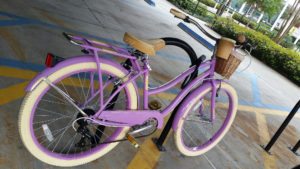The Tattoo Artist and the Barefoot Bandit
The wind was whipping empty black plastic bags above the sands like airborne jellyfish. Cameron stopped and looked around her for landmarks, but everything looked the same white-grey—the wooden slats beneath her feet, the buildings, the water—all bleached by the end-of-season steel sky. The smell of fried foods still crept out of the few open boardwalk stands, but at this time of year the paying customers were fewer than the seagulls that ate gratis.
There were a few bubbles of color imprisoned behind fences: kids rides covered over and locked down, bright outdoor benches pulled behind gates to collect dirt for the winter. The grey of the chains and fences seemed sharper than any of the blurbs of color, like the foreground in an amateur photograph.
The tattoo studio wasn’t near the boardwalk, that much Cameron knew for sure. It was down some sidestreet with crumbling asphalt, past a trailer selling deep fried foods on sticks, near a Giant Amazonian Sewer Rat or an Amazing Headless Lady. She could remember bits and pieces of descriptions woven through Sasha’s long narratives. Sasha’s voice in her mind was still clearer than the directions, though—quick, confident, laced with slang that would’ve been inappropriate coming out of Cameron’s mouth, but which Sasha managed to get away with. Like when Sasha described her boyfriend’s eyes as “chinky.” Cameron had nudged her then, but no one else in the room said anything. Sasha turned her own large black eyes on Cameron with unfeigned innocence and said, “What, Big Sis?” She was only nineteen.
She’s still a child, Cameron thought. She has time. But what am I still doing in places like this?
Now, under the flat grey sky and above the bleached boardwalk planks, Cameron turned in a slow revolution. The artist that tattooed for free had to be here somewhere.
*
They had been sitting in the dayroom when Sasha first mentioned the tattoo artist. Cameron had been there for over a week, and Sasha for three days. The bruises that had marked the younger girl’s arm and the side of her face had begun to fade into purplish pools that looked like stains from spilled wine that lingered after a desperate scrubbing. The Barefoot Bandit was on TV and Cameron kept telling Sasha to shut up, to watch the news, to stop acting like a child—this was what was happening in the world. But really, Cameron couldn’t stomach the news that was happening world-wide—children with limbs blown off, unmanned planes dropping bombs, towering walls built on borders and M-16s guarding them—she could only stomach the Barefoot Bandit, and ate up stories of him like a bloated pigeon gorging on after-wedding rice.
“Diabla,” Sasha was saying, and in the meantime little bare feet trekked across a map on the TV screen showing the summer houses the Barefoot Bandit had broken into, robbed, and left notes in declaring war on the police, and (even though he was still a teenager and had no formal lessons) the place he had stolen and flown a small plane from.
“Shut up, Little Sis,” Cameron said. “Watch this.”
Sasha looked around to make sure no one was watching and then quickly pulled her sky-blue elastic-banded pants down to reveal the top right of her bottom. “Diabla” was tattooed there in English Calligraphy font.
“Badass, right?” she said with her challenging half-smirk. “He tattoos for free if it’s on your ass.”
*
There was a man slamming a booth closed—one of two open in a row of steel gates surrounded by wooden window frames covered in once-bright red and yellow and blue paint. What had been inside the booth—a ring toss, a distorted basketball hoop, a row of clown heads with open mouths lined up across from water pistols like comic suicides—Cameron could not say. The man slamming the booth shut had a short salt-and-pepper beard, yellow from cigarette smoke.
“Where’s the World’s Smallest Woman?” she asked. She moved her hand into her purse by instinct, feeling all the things there: a wallet, her make-up bag, her tampon case, her cigarettes, her mace.
The man looked at her and he looked at her hand in her bag.
“She’s around here somewhere,” he said, and went back to closing the stand.
*
Another night, in the day room, they were showing a picture of the Barefoot Bandit in a Mercedes Benz shirt, reclining like a millionaire. He had taken the picture after joyriding in someone’s car, and left the picture behind. Cameron didn’t think he sounded like the best criminal, but she respected his verve. Everyone was there. Constance the long-haired schizophrenic, Daniel the inmate, Rudy the drunk. They were all watching the news.
“Big Sis,” Sasha said, “a few weeks before I got here, me and my boyfriend and our friends were drinking outside an abandoned building. We set that shit on fire. We sat there watching it burn.”
“You should have made sure nobody was squatting it, Little Sis,” Cameron said, watching the TV. She had taken to dispensing questionable advice to the younger girl in this offhanded manner. Though more sedate advice about taking meds and formatting her life around a structured schedule was something Sasha refused to accept, she seemed willing to listen to Cameron’s brand. It had even caused her to bestow Cameron with a nickname–“Big Sis.” Cameron had reciprocated with the diminutive version, and the two had persisted in the nicknames even as the other patients rolled their eyes and the nurses looked concerned. On the TV, the bare feet were back again, walking all over the state the Barefoot Bandit came from, then trekking off to all the subsequent places he had been.
The next day in arts and crafts group, Sasha started talking about arson.
“But I have to make sure I don’t hurt anyone, first,” Sasha said. “My Big Sis taught me that.”
Sasha smiled. Cameron laughed. The therapists did neither.
*
Now, away from the boardwalk, down a crumbled asphalt street, Cameron paid a dollar to stare into what appeared to be a dumpster at something that resembled a coiled rope more than a Giant Bloodthirsty Python. She looked away from the dark green metal container and saw, down the road, a blinking neon yellow sign. Sasha had never said the name of the studio, but the name of this studio was unreadable anyway: a victim of broken neon.
“Do you know anything about that tattoo studio?” she asked the man she had given the dollar to. He was piled with muscles. He had more of them than bottom teeth. He lowered his brows over his already dark eyes and looked to where she pointed, then back to her. Cameron felt conscious of the dark roots of her hair, her Salvation Army clothes, and the fading atrophic scars on her left arm.
The man shrugged. “Ask for Ratchet,” he said.
“Rat Shit?” she asked.
The eyebrows lowered again. “Ratch-et,” he enunciated. Spit flew between the gaps in his teeth.
*
Cameron was sitting on the off-white ledge of the big window, crying. Sasha strutted—Sasha always strutted, swinging her longs limbs lithely, her shoulders rolling like wavelets at low tide—over and said quietly, “What’s wrong, Big Sis?”
Cameron cried and cried. She had no power in her to stop. “I’m never going to get out of here,” she said.
Sasha could not possibly understand all the reasons–the medications that never seemed to change anything, the ones that made her body bloated and her hips and stomach squeeze like dough over the low-slung pants she still wanted to be able to wear; the therapists who nodded at everything she said, or the ones who asked, at every turn, in their infuriatingly calm voices, “How does that make you feel?” The two week mandatory stays that had happened at least once a year for so many years she had lost count, how they had taken the place of the vacations she’d worked so hard to go on in her early twenties; how she struggled, after these two week stays, to keep the jobs she had abruptly stopped coming in to, how she struggled to pay her rent after she got out; the good days when she was sure, absolutely sure, that it was all over, that things would stay good, that words like “learning to cope” and “managing your disease” were the bullshit she’d always taken them for and she had her life back as quickly as it seemed to have slipped out of her grasp—and the crashes that always brought her back, each time lower than she’d been before them. Sasha was still a child, Cameron knew she could not understand this all, and yet she put her arm around her anyway in a gesture strictly forbidden between patients.
“Yes, you will, Big Sis,” she said. “They can’t keep you here forever.”
Eventually the tears stopped. They hit a tall beige wall beyond which there was simply no more room for them, jagged breaths or hitching shoulders. Cameron steadied herself, hating that the blotched pink of her face would fade so much less quickly.
“You’re right, Little Sis,” she said. “The Barefoot Bandit is going to break in here and bust me out.”
*
Ratchet was short and stocky. His long brown hair was tied back at the nape of his neck with a plain rubber band, but the sea air had frizzed the short hairs near the front. They stood in a humidity induced halo around his face. He stood near the posters of flash art with his muscular, tattooed arms crossed over his chest. There was a hard half-smile on his face.
“You’re Ratchet?” Cameron asked.
He nodded once, his expression unchanging.
She knew, from friends who had been tattooed, that she should ask to see his portfolio. She could see several books sitting on a ludicrously red table next to a decrepit wooden chair the grey of the boardwalk planks. But she felt she shouldn’t ask. She looked at one of the tattoos on his forearm: a pinup girl with an exposed, cherry red nipple. The girl was winking lasciviously, as she would do every day until the skin of his forearm was no more.
“I want bare feet,” she said. “A trail of them.”
“Where?”
“On my ass.”
Ratchet smirked and looked directly at her ass. His eyes then moved up to her breasts. After pausing on these two spots, he took in the rest of her body with a slow, intentional gaze. She knew he saw the old scars running up her arm, remnants from the days when she had been Sasha’s age, and her troubles had seemed to everyone around her like things that would even out with time. Her used jeans that squeezed the fat around her hips so that it came up and out, as if her torso were something balanced atop their waistband. Cameron realized then that she hadn’t yet taken off the wrist band the nurses had scanned every time they gave her a pill: a white one for anxiety, a red one for ups; a blue one of downs, a green one for thoughts that moved like a new, shining orange roller coaster on a more fashionable beach. There hadn’t been time. She’d just been let out this morning, handed her wallet, her shoelaces, her belt. She had walked out the door into a day that was too sharply in focus after the soft edges of the hospital. Things would change. She would start doing Pilates. She would stop draining her bank account before she wrote her rent check. She would get a new boyfriend, one that wasn’t a drunk or a drug addict or played in a cover band. She would start waking up before noon. She would start styling her hair. But first a symbol. A sign that she was new. She tried not to move under Ratchet’s discomfiting gaze. She needed this.
As he continued to review her in silence, Cameron thought of how Sasha must have looked when she came here. From the story she’d heard in bits and pieces, it had been about an hour before she threatened to jump in front of the train, screaming and leaning her body out over the edge of the platform until her friends called the police, who wrestled her back and handcuffed her and called an ambulance. A time when she’d drank just enough alcohol that it wasn’t yet another oppressing force, a time when she felt, for a moment, free from the two bedroom apartment she shared with her six person family, the second senior year of high school that didn’t look like it would be the last, and the boyfriend who’s fear, jealousy, hate, anxiety and pleasure all reached her thorough his fists and left little spilled wine stains of bruises on the side of her face. But perhaps even in those relatively free moments, her looming gesture had already been showing on her face.
“Why bare feet?” he asked finally. The smirk was gone.
Cameron opened her mouth to tell him the story from the news. But the bravado of the stolen plane seemed false. She thought to tell him of Sasha in the dayroom, or by the windowsill. But she had left quickly, without even saying goodbye to the younger girl. And the Barefoot Bandit had never come to bust her out. Instead, he’d flown to the Bahamas where he’d been apprehended and taken off by men with shining silver badges.
“A child,” she said, finally. “A thief.”
Ratchet said nothing. He turned his eyes away from her body and to the flash art. This lack of look, she had seen it before–in bartenders as they served her the last drink they both knew she shouldn’t have, in therapists who suddenly stopped their incessant nodding and fixed their gazes just over her shoulder. Cameron was unsure of whether she heard a sigh come from him or from the fading scene beyond his neon window sign.
“Go in the first door on your right,” he commanded, not looking at her. “Lie on your stomach and take your pants off.”
**
Alex DiFrancesco is a writer of fiction, creative nonfiction, and journalism who has published work in Tin House, The Washington Post, Pacific Standard, and more. Their essay collection Psychopomps (Civil Coping Mechanisms Press) and their second novel All City (Seven Stories Press) are forthcoming in Spring of 2019. Their storytelling has been featured at The Fringe Festival, Life of the Law, The Queens Book Festival, and The Heart podcast. DiFrancesco is currently an MFA candidate at Cleveland State University. They can be found on Twitter, or, more often, snuggling their cat, Sylvia
**
Flickr / State Library Victoria Collections







